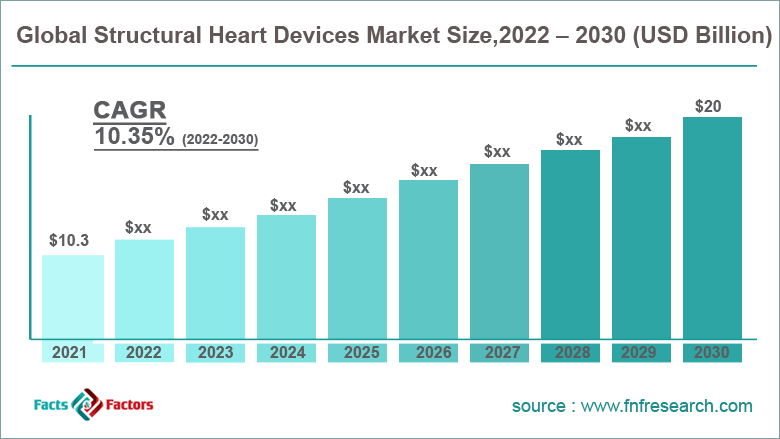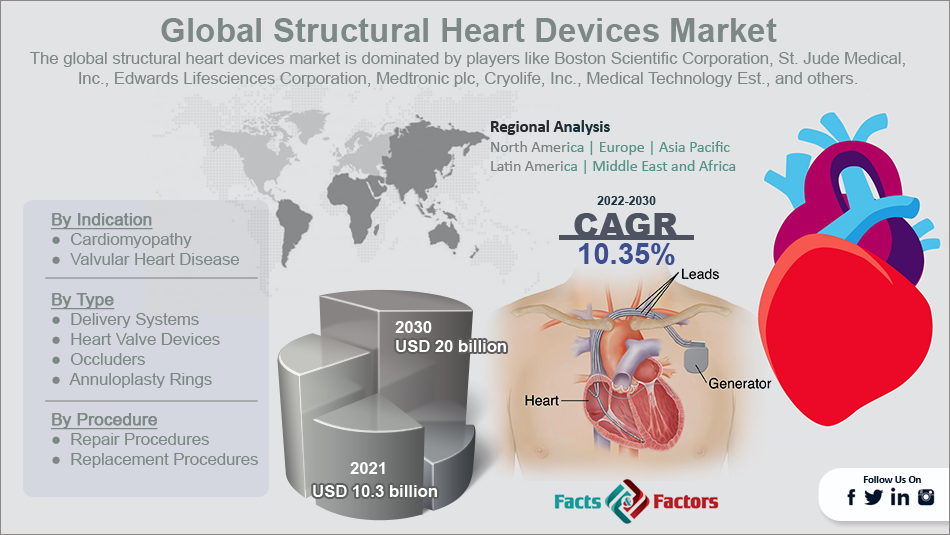Search Market Research Report
Structural Heart Devices Market Size, Share Global Analysis Report, 2022 – 2030

Structural Heart Devices Market Size, Share, Growth Analysis Report By Indication (Cardiomyopathy and Valvular Heart Disease), By Type (Delivery Systems, Heart Valve Devices, Occluders, and Annuloplasty Rings), By Procedure (Repair Procedures and Replacement Procedures), and By Region - Global and Regional Industry Insights, Overview, Comprehensive Analysis, Trends, Statistical Research, Market Intelligence, Historical Data and Forecast 2022 – 2030
Industry Insights
[201+ Pages Report] According to the report published by Facts and Factors, the global structural heart devices market size was worth around USD 10.3 billion in 2021 and is predicted to grow to around USD 20 billion by 2030 with a compound annual growth rate (CAGR) of roughly 10.35% between 2022 and 2030. The report analyzes the global structural heart devices market drivers, restraints/challenges, and the effect they have on the demands during the projection period. In addition, the report explores emerging opportunities in the structural heart devices market.

 Market Overview
Market Overview
Structural heart disease is a collection of medical conditions related to the heart. It is also called structural cardiac disease and includes coronary artery disease, heart failure, congenital heart disease, and hypertrophic cardiomyopathy. Medical conditions are induced by the improper functioning of the heart which means any activity or the scale of the activity that is not as per expected or standard terms. For instance, Heart failure is also known as congestive heart failure (CHF) which is a syndrome that reflects a group of symptoms and signs influenced by any impairment in the blood-pumping function of the heart.
Symptoms of CHF include excessive fatigue, shortness of breath, and leg swelling. CHF occurs when the heart is unable to pump blood as required which results in blood backing up and the building of fluids in the lungs which is the main reason for shortness of breath. There are different reasons that can cause CHF like narrowing of heart arteries or hypertension which is the other name for high blood pressure. Such factors gradually weaken the heart leaving it with no energy to pump the blood as it should. One of the most recommended ways of preventing heart failure is to control the reasons that cause it like obesity, diabetes, and other conditions.
 Key Insights
Key Insights
- As per the analysis shared by our research analyst, the global structural heart devices market is estimated to grow annually at a CAGR of around 10.35% over the forecast period (2022-2030)
- In terms of revenue, the global structural heart devices market size was valued at around USD 10.3 billion in 2021 and is projected to reach USD 20 billion, by 2030.
- The market is projected to grow at a significant rate due to the growing obesity index across the globe
- Based on indication segmentation, valvular heart disease was predicted to show maximum market share in the year 2021
- Based on procedure segmentation, repair procedures were the leading processes in 2021
- On the basis of region, North America was the leading revenue generator in 2021

 Growth Drivers
Growth Drivers
- Increasing obesity index to propel market demand
The global structural heart devices market is projected to grow owing to the rise in the obesity index observed across the globe which is one of the major reasons for cardiac issues amongst other medical issues. There are various ways in which obesity can be directly linked to cardiac diseases which include structural heart disease. Obesity generally leads to a rise in bad cholesterol and triglycerides levels which have severe negative health implications.
People who are overweight can also suffer from high blood pressure which is induced because more blood is required to supply the necessary amount of nutrients and oxygen that the body needs to properly function. The added pressure is also needed to help the blood move across the body. Hypertension is a leading cause of heart attack and obese people are more at risk. As per the World Health Organization (WHO), the current obesity rate across the globe has increased more than 3 times since the rate was established in 1975 with more than 650 million people being overweight.
 Restraints
Restraints
- High cost to research market expansion
Medical treatments related to cardiac concerns are expensive and this trend is not limited to only certain parts of the world. Even in developed economies, undergoing treatment processes or surgeries related to the heart are high in cost, however since they have excellent medical care and reimbursement policies in place, the cost gets covered. The most intense burden of structural heart disease is witnessed in low-income countries and regions that do not have the necessary medical infrastructure. Cardiomyopathy can cost up to USD 20,000 per surgery.
 Opportunities
Opportunities
- Increasing investments in healthcare to create growth opportunities
The global structural heart devices market is anticipated to benefit from the increasing investments observed globally in medical and healthcare infrastructure. In May 2022, the official website of the Government of Canada released press news that the country has committed investment of an additional $ 2 billion to be directed toward healthcare funding in the country which will assist in clearing all the backlogs and help in conducting hundreds of surgeries. The amount is a part of the country’s Bill C-17 which was passed by the federal government in the House of Commons. The top-up is an addition to the already announced fund of $ 87.6 billion to be transferred by 2023.
 Challenges
Challenges
- Associated risks to pose as major challenges during the expansion phase
Structural heart devices cannot be claimed to be risk-free as multiple there have been reported cases of multiple associated side effects. For example, complications that may arise due to artificial heart valves include valve obstruction, bleeding, embolic events structural deterioration which is more common for bioprosthetic valves, infective endocarditis, and some other more serious conditions like a mismatch between the prosthesis and the patient. These factors could challenge global market growth since the side effects may be more complex in certain cases.
 Segmentation Analysis
Segmentation Analysis
The global structural heart devices market is segmented based on indication, type, procedure, and region
Based on indication, the global market segments are cardiomyopathy and valvular heart disease. The global market was led by the valvular heart disease segment in 2021 owing to the high prevalence of the medical condition which is caused when the heart’s valve is diseased or undergoes any form of damage. The most common forms of valvular heart disease are organic and ischemic (functional) mitral regurgitation, aortic stenosis (AS), and tricuspid regurgitation. The geriatric population is more prone to the disease. As per the Centers for Disease Control and Prevention, around 2.5% of the American population suffers from the condition out of which 13% are people above the age of 80 years.
Based on procedure, the global market is segmented into repair procedures and replacement procedures. The global market registered the highest demand for repair procedures since replacement activities are known to reduce the heart’s functioning capabilities. In replacement processes, the patient is allowed to keep the valve and the survival rate. The bleeding risk gets significantly reduced which results in higher postoperative patient safety. The Cleveland Clinic states that the durable solution for mitral valve disease is the repair process and almost 90% of repaired valve cases can last up to 20 years.
 Recent Developments:
Recent Developments:
- In December 2022, Abbott, a leading multinational healthcare company, announced the launch of transcatheter aortic valve implantation (TAVI) system, the latest device to be added to its next-generation devices in the Indian market
- In May 2022, Philips, a Dutch multinational conglomerate, launched a new solution called EchoNavigator 4.0, which can effectively treat structural heart disease
 Report Scope
Report Scope
Report Attribute |
Details |
Market Size in 2021 |
USD 10.3 Billion |
Projected Market Size in 2030 |
USD 20 Billion |
CAGR Growth Rate |
10.35% CAGR |
Base Year |
2021 |
Forecast Years |
2022-2030 |
Key Market Players |
Boston Scientific Corporation, St. Jude Medical Inc., Edwards Lifesciences Corporation, Medtronic plc, Cryolife Inc., Medical Technology Est., and others. |
Key Segment |
By Indication, Type, Procedure, and Region |
Major Regions Covered |
North America, Europe, Asia Pacific, Latin America, and the Middle East &, Africa |
Purchase Options |
Request customized purchase options to meet your research needs. Explore purchase options |
 Regional Analysis
Regional Analysis
- North America to lead with the highest market share
The global structural heart devices market is projected to register the highest growth in North America led by the US due to the presence of the biggest manufacturers of such devices as well as the growing demand for structural heart surgeries. The US has one of the most advanced healthcare infrastructures across the globe, especially for critical surgeries like the treatment of structural heart conditions. The region has also witnessed a swift change in its methodologies adopted to treat critical patients as with constant research & development, the previous high-risk cardiac operations have now moved to minimally invasive surgical techniques that do not exhibit any side effects and are patient-friendly. Growth in Europe is projected to be driven by the growing number of surgeries being conducted in the regions that are world-renowned for high success rates like Turkey and the UK.
 Competitive Analysis
Competitive Analysis
- Boston Scientific Corporation
- St. Jude Medical Inc.
- Edwards Lifesciences Corporation
- Medtronic plc
- Cryolife Inc.
- Medical Technology Est
The global structural heart devices market is segmented as follows:
 By Indication Segment Analysis
By Indication Segment Analysis
- Cardiomyopathy
- Valvular Heart Disease
 By Type Segment Analysis
By Type Segment Analysis
- Delivery Systems
- Heart Valve Devices
- Occluders
- Annuloplasty Rings
 By Procedure Segment Analysis
By Procedure Segment Analysis
- Repair Procedures
- Replacement Procedures
 By Regional Segment Analysis
By Regional Segment Analysis
- North America
- The U.S.
- Canada
- Mexico
- Europe
- France
- The UK
- Spain
- Germany
- Italy
- Nordic Countries
- Denmark
- Sweden
- Norway
- Benelux Union
- Belgium
- The Netherlands
- Luxembourg
- Rest of Europe
- Asia Pacific
- China
- Japan
- India
- Australia
- South Korea
- Southeast Asia
- Indonesia
- Thailand
- Malaysia
- Singapore
- Rest of Southeast Asia
- Rest of Asia Pacific
- The Middle East & Africa
- Saudi Arabia
- UAE
- Egypt
- South Africa
- Rest of the Middle East & Africa
- Latin America
- Brazil
- Argentina
- Rest of Latin America
Industry Major Market Players
- Boston Scientific Corporation
- St. Jude Medical Inc.
- Edwards Lifesciences Corporation
- Medtronic plc
- Cryolife Inc.
- Medical Technology Est
Frequently Asked Questions

Copyright © 2025 - 2026, All Rights Reserved, Facts and Factors


